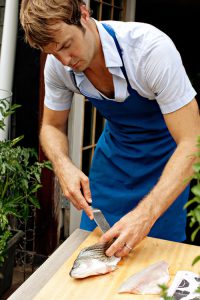Barton Seaver on Expanding Aquaculture Responsibly
 Editor’s note: The following is a guest blog post by chef, author and seafood advocate Barton Seaver. GAA and Seaver recently announced a partnership to raise public awareness of responsible aquaculture and the importance of sourcing seafood with provenance.
Editor’s note: The following is a guest blog post by chef, author and seafood advocate Barton Seaver. GAA and Seaver recently announced a partnership to raise public awareness of responsible aquaculture and the importance of sourcing seafood with provenance.
‘Tis the season when we take stock of the past year and determine which challenges we’ll seek to take on in the one ahead. In both instances, I’m contemplating the work being done to expand aquaculture in a responsible fashion.
Last March I testified before the U.S. Senate Committee on Commerce as it began its work on legislation that will shape the future of on-shore, near-shore and off-shore aquaculture in American waters and set a course for how those operations will affect other aquaculture outfits in other parts of the world.
During that testimony I pointed the senators’ attention to a paper on the political economics of marine aquaculture in the United States. I explained how its authors – Gunner Knapp, a recently retired scientist from the University of Alaska, and Michael Rubino, director of the Office of Aquaculture at National Oceanic and Atmospheric Administration Fisheries Service – say the biggest impediment to developing American aquaculture today is the industry’s lack of social license. An industry gains social license only when the general public fully understands the benefits it brings to the table.
Legislation has since been filed in both the Senate and the House of Representatives that would give NOAA regulatory authority over fish farming in federal waters, a measure that could streamline leasing processes and set responsible aquaculture protocols. And just a few days ago, Canadian authorities announced several initiatives aimed at ensuring its country’s aquaculture sector is economically successful and environmentally sustainable. As those potential regulations were being drafted, two important reports – one released by the United Nations Food and Agriculture Organization and a second inter-agency one released by the White House – painted a dire picture of how climate change is effecting both wild fisheries around the world and the United States’ diminishing ability to grow its own food on land come 2050.
What’s getting lost between the low, slow din of establishing a federal regulatory process here in the United States and the high-pitched alarms about climate change, though, are the benefits that a robust and expanding aquaculture industry could offer the global community.
Those benefits include a healthier, more food-secure citizenry as we can enable better access to more seafood across all demographics. A burgeoning aquaculture industry will also be attractive to the next generation of scientists, technologists and business entrepreneurs as they dive into the unique chance to establish a worldwide model for responsible and ecologically sustainable aquaculture practices from the seafloor up. And the economic development spurred on by new jobs farming, distributing and selling aquaculture products will have positive civic (increased tax bases) and social (less poverty) ramifications.
And finally, research shows that of all farmed animal proteins, farming seafood produces far fewer greenhouse gasses than farming beef, pork or chicken on land does. So a mushrooming aquaculture industry can also be a means by which we can lessen the effects of human activity on climate.
I challenge you, just as I challenge myself, as a citizen of the global community, to think of aquaculture and seafood not as an isolated industry or a single product category but as a new frontier. Our goal to make seafood sustainable still stands, certainly, but we must also test how we can use seafood to fix and expand the global food system at large.




